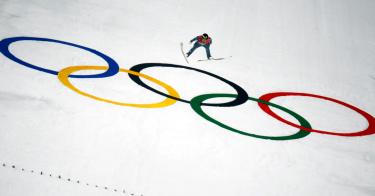Anyone who thinks that politics are new to the Olympics doesn’t know the Games. But there are politics, and then there are politics. The politics of the 2018 Winter Games are blatant. And they’re working.
The modern Games, which began in 1896, were founded for political purposes, albeit subtle ones. Then, they were intended as an example of politely patriotic competition to counterbalance the rising, but purportedly crass, power of commerce and the working class.
That, of course, was a political goal. But it was politics by example, and it was none too successful: European society lost its aristocratic tone, and the United States never acquired it. The politics of today’s Games are more obvious, and unfortunately, more successful.
We now know that, during the last Winter Games in Sochi, the Russian team benefitted from a state-run doping program. As a result, Russia was banned by the International Olympic Committee from this Winter Games.
That was the right decision. For too long, international organizations like the IOC have refused to uphold standards for membership. They’ve only tried to get everyone inside the tent. That’s like putting an unrepentant bank robber on the security detail at Fort Knox. But the IOC couldn’t hold the line; 169 nominally clean Russian athletes made it to South Korea. That’s only 8 fewer athletes than Russia sent to the 2010 Winter Games.
Nor have the Russians been shy about taking their place in the sun. As Russia’s ambassador to South Korea put it last week, “Russia is a full participant in the Olympic Games.”
This stinks. True, 47 Russian athletes who doped stayed home. But Russian athletes at Sochi didn’t just benefit from doping. They also benefitted from a state-run training program, and participated as a national team. So Russian athletes get the benefits of state aid — including drugs. But then, when Russia gets found out, its athletes are treated as individuals, including being considered innocent until proven guilty.
That means it’s all but impossible to actually kick a nation out of the Olympics. So we still have no meaningful standards for membership.
And then there’s Kim Yo Jung, sister of North Korea’s dictator, who made a splash at the Games. On one level, this is pathetic. Shakespeare told us that “one may smile, and smile, and be a villain,” and he was right. She’s a villain, no matter how nicely she smiles.
But something bigger is going on in South Korea, just as it did at the 1988 Summer Games in Seoul. Those Games marked the transition of the modern Olympics from nationalist Cold War competition to touchy-feely celebration of multiculturalism and sickly-sweet universal tolerance.
That was partly because by 1988 the Cold War was almost over. But it was mostly because South Korea wasn’t a democracy in 1988, and its regime wanted its Games to have a theme that would make it look good. It worked and every Olympics since then has followed the pattern. The only difference is that this time, North Korea succeeded in sharing the stage with South Korea.
This isn’t about transcending politics: it’s about playing politics, with each nation trying to out-bid the other in looking eager to get along. The difference, of course, is that South Korea is a decent place, whereas North Korea is not. It’s a vital distinction.
It’s just too bad that, with Russia present and unrepentant and North Koreans cheerleading, the Olympics aren’t much interested in promoting decency.
This piece originally appeared in Newsday



